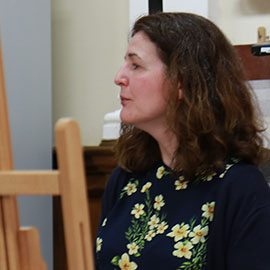Conservation of Fine Art (Easel Paintings) MA
2 Years Full-Time | September Start
 Option for Placement Year
Option for Placement Year
 Option for Study Abroad
Option for Study Abroad

International
Northumbria’s global footprint touches every continent across the world, through our global partnerships across 17 institutions in 10 countries, to our 277,000 strong alumni community and 150 recruitment partners – we prepare our students for the challenges of tomorrow. Discover more about how to join Northumbria’s global family or our partnerships.
View our Global FootprintBusiness
The world is changing faster than ever before. The future is there to be won by organisations who find ways to turn today's possibilities into tomorrows competitive edge. In a connected world, collaboration can be the key to success.
More on our Business ServicesResearch
Northumbria is a research-rich, business-focused, professional university with a global reputation for academic quality. We conduct ground-breaking research that is responsive to the science & technology, health & well being, economic and social and arts & cultural needs for the communities
Discover more about our ResearchAlumni
Northumbria University is renowned for the calibre of its business-ready graduates. Our alumni network has over 246,000 graduates based in 178 countries worldwide in a range of sectors, our alumni are making a real impact on the world.
Our AlumniIf you’d like to receive the latest updates from Northumbria about our courses, events, finance & funding then enter your details below.
* At Northumbria we are strongly committed to protecting the privacy of personal data. To view the University’s Privacy Notice please click here
 Option for Placement Year
Option for Placement Year
 Option for Study Abroad
Option for Study Abroad

The MA Conservation of Fine Art programme (Easel Paintings) will provide you all the knowledge and skills necessary for a career as an art conservator.
This postgraduate programme aims to provide you with advanced knowledge and skills in both practice and research for the conservation of easel paintings. Northumbria University’s Conservation of Fine Art MA is the only Master of Arts programme in the UK that offers the specialisms in both the conservation of Easel Painting or Works of Art on Paper.
Our Conservation of Fine Art Masters programme aims to develop your skills in critical awareness, research, ethics and philosophy, art history, conservation science and the care of collections, in addition to honing the meticulous practical skills necessary to become a conservator.
It is the combination of meticulous practical skill, a sound knowledge of science, and passion for the art and art history that makes this Masters programme of interest to those from both a science and arts background.
Integrating a mix of studio practice, science and art history, the programme covers a range of subjects. You will study studio practice, conservation theory and ethics, science, art history and technical art history, preventive conservation and research skills.
The Conservation of Fine Art MA Easel Painings is a vocational programme and on graduation you will have all the highly specialised knowledge and skills to formally enter the conservation profession.
In order to broaden your cultural perspective and enhance your practical learning experience, you will also have the opportunity to carry out a placement in the Summer recess. Students carry out placements in institutions in the UK and globally; a number of hosting institutions over the years have included the British Museum, the National Museum of Australia, Royal Ontario Museum Tate as well as a number of private conservation studios.
We welcome applications from students from a wide range of academic backgrounds. Students come from a range of backgrounds including Fine Art, Art History and the Sciences.
You may also be interested in Conservation of Fine Art (Works of Art on Paper), please click here for more information.
If you’d like to browse what other postgraduate programmes we offer or have any queries, please get in touch.
The role of the easel paintings conservator involves the general care, protection, repair and cleaning of works of art in oil, egg tempera, distemper, acrylic, or other media. This includes works of art on a great variety of supports, including canvas, board, wood panel and metals. A professional easel painting conservator could be involved with works of art as diverse as early medieval religious images to large contemporary artefacts, often in mixed media.
Extremely high levels of practical skill and intellectual understanding are required for both the treatment and analysis of historical and technical aspects of paintings. Detailed examination and technical interpretation of works of art forms the basis of working practice, enabling the professional paintings conservator to make informed treatment decisions. The collation and dissemination of historical and technical data stems from an in-depth understanding of the subject.
Opportunities for employment can be found in both the public sector, in museums and galleries, as well as within private studios. Professional easel painting conservators often liaise closely with a range of museum staff, including front of house, curatorial and interpretation officers, when preparing individual paintings or collections for exhibition, display, loan or long-term storage. Other diverse aspects of the work of an easel painting conservator might include preparing paintings for transportation, couriering works, assessing environmental conditions, surveying collections, report writing, planning and tendering for work, carrying out research and public speaking.
Cultural partnerships are when institutions work together to promote art, traditions, or values. At Northumbria, this includes museums, charities, and other education partners teaming up to create an enhanced curriculum designed to support your learning experience and employability. These partnerships help you:
Students studying Conservation of Fine Art will benefit directly from our education partnership with North East Museums. This may involve gallery and venue tours around the city.
Level of Study
Postgraduate
Mode of Study
2 years Full Time
Department
Northumbria School of Design, Arts and Creative Industries, Arts
Location
City Campus, Northumbria University
City
Newcastle
Start
September 2025
Fees
Fee Information
Discover the funding options available to you.
Get an introduction to Conservation of Fine Art and hear from a MA student.
Offering the opportunity for you to specialise in easel painting conservation, this programme consists of four modules that explore a range of key areas of study, including conservation theory and practice, conservation science, conservation ethics, art history and preventive conservation.
The programme covers a range of conservation treatments informed by current research in the field, and you will gain a plethora of valuable technical and academic skills including; conservation documentation, technical examination in addition to the structural repair, stabilisation, consolidation and cleaning of works of art.
Most importantly, you will develop the confidence and knowledge to critically evaluate your approach to conservation treatments and become a competent, confident and reflective practitioner. You will also develop a sophisticated understanding of the history, identification and deterioration of artist’s materials that are associated with easel paintings. Significant emphasis is also placed on ethics, advocacy, and developing your research skills.
The programme offers a combination of conservation theory and practice. Through a series of focused practical workshops, you will develop a broad range of skills in preparing and using conservation materials and equipment. Workshop activities are performed on a range of materials: from original works of art to historically accurate recreations that allow students to explore the limits of treatment that would not otherwise be possible with original works of art.
Assessment focuses on your theoretical understanding of practical methods and treatments in addition to conservation science, preventive conservation and help to develop your practical and communication skills and evaluate and reflect upon your conservation decision-making.
You will begin to develop ideas for your dissertation research in the first year and write a substantial dissertation at the end of the second year demonstrating your knowledge and understanding of a focused area of conservation theory or practice.
Take a look at what Northumbria has to offer and discover what studying with us can do for you.
In additional to being practicing conservators and conservation scientists, academic staff are research-active and regularly carry out research and consultancy in the conservation and heritage science fields, enhancing research-rich learning and teaching on the programme.
The content of the course also aligns with the standards of professional bodies in the sector.
Throughout the duration of this course, you will receive ongoing support from teaching staff to ensure you leave equipped with the necessary skills and knowledge to successfully pursue a career within the Conservation sector or a related discipline.

Dr Charis Theodorakopoulos
Programme Leader

Nicola Grimaldi
Assistant Professor, Easel Paintings

Dr Richard Mulholland
Assistant Professor, Works on Paper

Penelope Banou
Lecturer, Works on Paper
Take a look at what Northumbria has to offer and discover what studying with us can do for you.
The MA Conservation of Fine Art programme is based at Burt Hall, a Grade II listed building, at the centre of Northumbria’s City Campus in the heart of Newcastle’s city centre.
Burt Hall boasts two state of the art, professionally-equipped conservation studios, together with a technical examination and photography unit, a microscopy suite and a materials analysis laboratory. Conservation studios are equipped with local fume extraction, tracked daylight balanced lighting, hot and cold low-pressure tables, heated sinks with reverse osmosis and deionised water purification systems. Each studio also contains large video screens to which macro and micro imaging systems are attached. Students also have access to an important archive collection of historic artists’ materials.
Xenon-Arc fadeometer (accelerated ageing)
Thermal and relative humidity chamber (accelerated ageing)
X-Radiography
Visible and Infrared Reflectance, and UV Fluorescence
Vis, UVf and Green Light Optical Microscopy (OM)
Polarised Light Microscopy (PLM)
Colourimetry
Glossimetry
X-Ray Fluorescence (XRF) spectroscopy
Imaging Fourier Transform InfraRed (FTIR) Spectroscopy
Students may also have the opportunity to access other analytical facilities in the wider university, to support their second-year dissertation research, where available.
One of the most important aspects of the programme is the the development of your independent and self-directed study skills via our online learning platform, Blackboard Ultra. On this platform, you will access bespoke learning materials via online lectures, dynamic reading lists, video demonstrations, live online seminars and videos of guest lecturers from the professional conservation field.

Burt Hall - built in 1895, by John W. Dyson for the Northumberland Miners' Association; now part of Northumbria University.
Take a look at what Northumbria has to offer and discover what studying with us can do for you.
Research-rich learning is embedded throughout all aspects of this programme. Our staff are continuously informed by developments in conservation research and global debates on conservation theory and practice.
Our staff possess individual specialisms within their field in areas such as the development and evaluation of conservation treatments for paintings, the materials and techniques of modern drawings, research on the conservation and safeguarding of cultural heritage collections at risk in world conflict zones, studies in material deterioration, the treatment of iron gall ink and oil paintings on paper, and the use of gels and lasers for conservation treatments.
The programme takes an enquiry and research-based learning approach, which is strongly student-centered, and provides students with the opportunity to develop and enhance marketable skills in self-directed study, independent research, interpersonal learning and communication.
You will be encouraged to develop your own individual research skills and knowledge in a specialist area of the conservation of works on paper. Under the guidance of your assigned tutor you will design and implement a significant piece of research for your dissertation in the second year.
Take a look at what Northumbria has to offer and discover what studying with us can do for you.
Throughout the duration of the programme, you will develop employability skills, not only as a conservation practitioner in your chosen specialism, but through participation in seminars and class discussions where you will develop important ‘soft skills’, that will enable you to take the first step in your career as a conservator. Northumbria University is committed to enhancing employability of its students by supporting students in their career journey while on the programme and beyond. In addition to completing a professional placement to further enhance your development, students have the opportunity to present their own research at the annual Gerry Hedley Student Symposium organised by the conservation departments at Northumbria University, the Courtauld Institute, London and the Hamilton Kerr Institute, University of Cambridge.
Staff have a strong professional network which, together with a worldwide cohort of alumni, assists in providing students and graduates with placement and job opportunities. Students are actively encouraged to organize and participate in placements during the summer recess between year one and year two in order to gain valuable experience that can be taken forward into the second year.
We actively encourage students to join professional conservation bodies, such as the Institute of Conservation (ICON), the International Institute for Conservation of Historic and Artistic works (IIC) and the International Council of Museums Committee for Conservation (ICOM-CC), all of which have vibrant student and emerging conservator networks. Students are also encouraged to attend and speak at professional conferences, particularly those that are student-led. This helps you to network with professionals and peers working within the profession.
You will also benefit from our formal partnerships with the Northumbria University collections and archives and with several local and national museums (for example: Tyne and Wear Archives and Museums, the Bowes Museum, the National Museum of Scotland, V&A, and Tate). We also have a long-standing relationship with the National Trust in the UK, who have provided students with opportunities for study and project work in the past.
On completion of the programme, students typically find employment in galleries, libraries, archives, museums and other heritage institutions, or continue their research to PhD level.
Northumbria University Conservation of Fine Art alumni influence conservation and heritage policy throughout the world. Some notable alumni include; Virginia Lladó-Buisán, Head of Conservation & Heritage Science, Bodleian Libraries; Britta New, Senior Painting Restorer, National Gallery, London; Anne Slettemoen, Head of Conservation at the National Museum of Sweden; Alan Derbyshire, former Head of Paper, Book and Paintings at the V&A; Dr Bronwyn Ormsby, Principle Conservation Scientist Tate, and Nick Dorman, Chief Conservator Seattle Art Museum.
Take a look at what Northumbria has to offer and discover what studying with us can do for you.
Applicants should normally have:
A minimum of a 2:1 honours degree in a related subject such Fine Art, Art History, Conservation, or Applied Sciences, including Chemistry, Physics, Biology, Forensic Science, Polymer Science or Chemical Engineering. although applicants from other related fields will also be considered.
Applicants with science backgrounds must have interest in learning about practical art, and arts graduates should have minimum grade 7 or higher in GCSE Chemistry or 65% or above in the Chemistry for Conservators’ Certificate from the International Academic Projects correspondence course.
Applicants are required to have sound colour vision, manual dexterity, logical thought and the ability to apply theoretical knowledge to changing practical situations. Applicants should also appreciate the integrity of works of art and have a sensitivity of approach, along with a calm temperament and infinite patience.
International qualifications:
If you have studied a non UK qualification, you can see how your qualifications compare to the standard entry criteria, by selecting the country that you received the qualification in, from our country pages. Visit www.northumbria.ac.uk/yourcountry
English language requirements:
International applicants are required to have a minimum overall IELTS (Academic) score of 6.5 with 5.5 in each component (or approved equivalent*).
*The university accepts a large number of UK and International Qualifications in place of IELTS. You can find details of acceptable tests and the required grades you will need in our English Language section. Visit www.northumbria.ac.uk/englishqualifications
Full UK Fee: £24,700
Full International Fee: £41,900
Scholarships and Discounts
ADDITIONAL COSTS
Students on the Easel Paintings route are required to supply one painting at the beginning of Semester one, Year One. A traditional aged, oil painting will be required for practical activities and exploration of selected conservation techniques. Please choose a painting that is sufficiently deteriorated, so it offers various treatment challenges. Students are urged to source work of low value: a maximum value of £50 is recommended. It is essential that you acquire your own set of tools to avoid sharing and contamination. The list below are the basics required to perform practical activities in commencing Year 1. TOOLS SUGGESTED SUPPLIER COMMENTS Black apron, smock, or large cotton shirt/Amazon or Wilk/It must be black Toolbox/Amazon or Wilk/No larger than 40 X 25 X 25 Tape measure/Easy to find from many DIY or hardware stores. Scissors (Large & Small)/Easy to find from many DIY or hardware stores. Stanley Knife/ Easy to find from many DIY or hardware stores. Linen Counter or Linen tester/ Preservation Equipment Palette knifes (1 straight handle)/Jackson Art Scalpel handles (Size 3 for small blades & Size 4 for large blades)/ Preservation Equipment Spatulas or filling tools (Small stainless steel)/Preservation Equipment
* At Northumbria we are strongly committed to protecting the privacy of personal data. To view the University’s Privacy Notice please click here
else
Our Applicant Services team will be happy to help. They can be contacted on 0191 406 0901 or by using our Contact Form.
Full time Courses are primarily delivered via on-campus face to face learning but could include elements of online learning. Most courses run as planned and as promoted on our website and via our marketing materials, but if there are any substantial changes (as determined by the Competition and Markets Authority) to a course or there is the potential that course may be withdrawn, we will notify all affected applicants as soon as possible with advice and guidance regarding their options. It is also important to be aware that optional modules listed on course pages may be subject to change depending on uptake numbers each year.
Contact time is subject to increase or decrease in line with possible restrictions imposed by the government or the University in the interest of maintaining the health and safety and wellbeing of students, staff, and visitors if this is deemed necessary in future.
Northumbria University is committed to developing an inclusive, diverse and accessible campus and wider University community and are determined to ensure that opportunities we provide are open to all.
We are proud to work in partnership with AccessAble to provide Detailed Access Guides to our buildings and facilities across our City, Coach Lane and London Campuses. A Detailed Access Guide lets you know what access will be like when you visit somewhere. It looks at the route you will use getting in and what is available inside. All guides have Accessibility Symbols that give you a quick overview of what is available, and photographs to show you what to expect. The guides are produced by trained surveyors who visit our campuses annually to ensure you have trusted and accurate information.
You can use Northumbria’s AccessAble Guides anytime to check the accessibility of a building or facility and to plan your routes and journeys. Search by location, building or accessibility feature to find the information you need.
We are dedicated to helping students who may require additional support during their student journey and offer 1-1 advice and guidance appropriate to individual requirements. If you feel you may need additional support you can find out more about what we offer here where you can also contact us with any questions you may have:
If you’d like to receive the latest updates from Northumbria about our courses, events, finance & funding then enter your details below.
* At Northumbria we are strongly committed to protecting the privacy of personal data. To view the University’s Privacy Notice please click here
Back to top